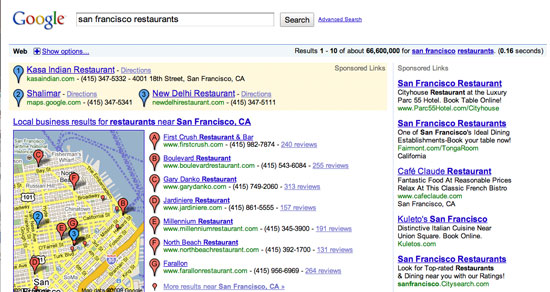- 12 Oct
Are Google Local Listing Ads the Death of Internet Yellow Pages
Last week, Google announced Local Listing Ads, a paid alternative to the free business listings within Google Maps. The ads sit above the free maps listings, but are smaller than traditional AdWords, and are below the top AdWords listing, at least in many cases.

In the above example, the listings marked with bubbles #2 and #3 are Local Listing Ads.
Currently, the test is running in San Francisco and San Diego only, but I expect the test area to spread quickly, if Google views it as a success.
Google Local Listing Ads represent a significant threat to Internet Yellow Pages such as CitySearch and Yelp. The IYPs rely heavily on organic search traffic from Google that is directed to their advertisers. In fact, in many cases they sell on the idea that advertising with their service is a way to have one’s company come up in the organic listings (albeit a page from the IYP’s site, not a page from the advertiser’s site).
And, for a few years now, this model has worked well. The IYPs have well established sites with lots of links, and they know how to optimize their pages for the search engines. Advertisers with the IYP have received a great deal of targeted traffic.
But with the Google Maps listings being added to Google Universal Search, the organic listings are generally pushed below the fold (even on a large monitor).
The IYP countered this by purchasing AdWords to continue to push traffic to their site.
Google Local Listing Ads could be a major problem, however. If they work as Google hopes, small, local businesses will go directly to Google to purchase advertising. And if the traffic at the IYP drops, the advertisers may drop that channel.
There is no guarantee that they will work as Google hopes, however. Small businesses require definite hand-holding when it comes to advertising, and customer service has never been Google’s strong point. The IYP’s however, are generally quite good at customer service.
They are also out in the community actively selling, while Google has always relied on its advertisers coming to Google without much individual enticement.
It’s too early to say where this all will go, but hopefully the IYPs will view it as an object lesson in the dangers of relying solely on Google for your business model.
About the Author
